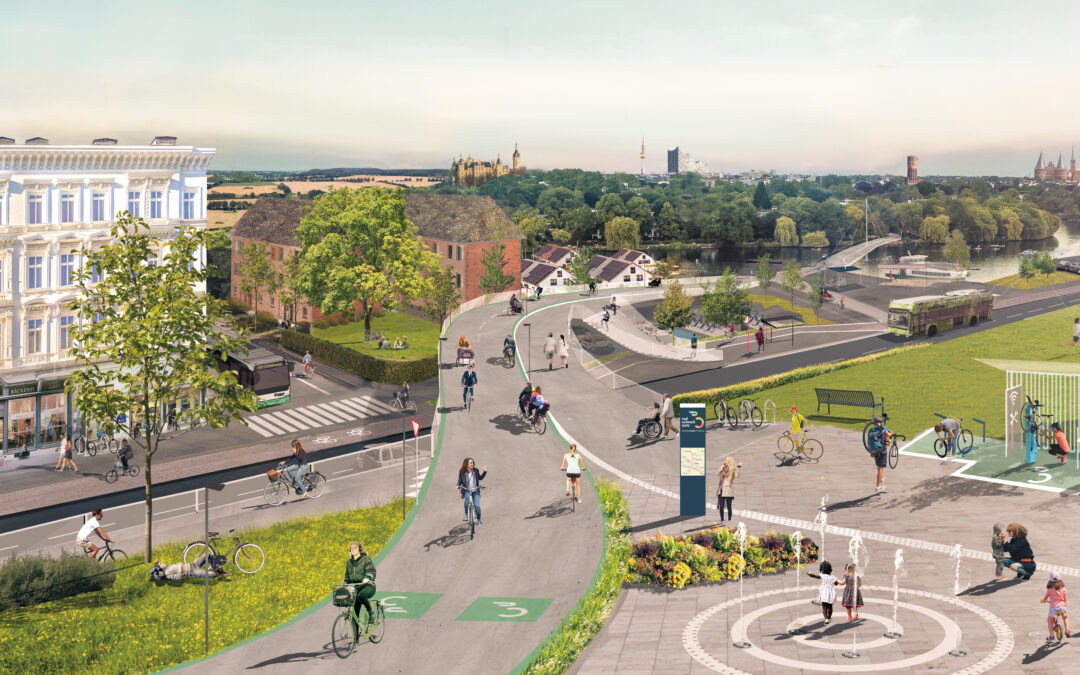Innovative and sustainable concepts to improve mobility for everyone and achieve the jointly set climate protection goals – these were two of the main topics that the 400 or so participants at this year’s regional conference of the Hamburg Metropolitan Region on January 19, 2023 in Hamburg City Hall dealt with.
Under the motto “What moves us”, the conference, which took place for the first time in three years, focused in particular on the potential of cycling for the metropolitan region. For example, individual mobility is to be improved in future with the expansion of a transnational high-speed cycle network. In addition, cycling is to be established as an attractive and environmentally friendly alternative to the car for the majority of commuters in the greater Hamburg area.
In his welcoming address, Hamburg’s First Mayor Dr. Peter Tschentscher picked up on these guiding principles of the conference and highlighted the bicycle as the central key to the transport transition in his remarks. Especially on the last mile between home and work, the bicycle offers significant added value for the mobility transition. The role of the bicycle must be further strengthened in terms of its attractiveness and in combination with other modes of transport.
“That is why we are modernizing the transport infrastructure and creating new connections on roads, railways and high-speed cycle paths. Innovative concepts can be used to create new forms of mobility and better networking between modes of transport,” said Tschentscher, summarizing the large number of measures planned and currently being implemented in the transport sector.
In his subsequent video message, Federal Transport Minister Dr. Volker Wissing also highlighted the mix of different measures in the city of Hamburg to manage the transport transition. He highlighted the strong interlinking of mobility and digitalization in Hamburg, which has received special recognition in the course of the recently created “Metropolitan Model Region Mobility”. A pioneering project for Germany is a test track for automated and connected driving (TAVF) in Hamburg city centre, a project that is being funded by the Federal Ministry for Digital and Transport and the European Union as part of the Connected Europe Facility (CEF) as part of the “Digitalization of municipal transport systems” funding guideline.
In combination with the testing of other measures, such as the autonomous minibuses in HafenCity and the digital S-Bahn, these projects were also ideally combined with the expansion of individual cycling to create a holistic and modern mobility concept. The acceptance of mobility concepts in society was the central topic of a panel discussion between Hartmut Höppner, State Secretary at the Federal Ministry of Digital and Transport, Dr. Anjes Tjarks, Senator of the Ministry of Transport and Mobility Transition in Hamburg, Elfi Heesch, District Administrator of Pinneberg and Prof. Carsten Gertz from the Technical University of Hamburg. The common tenor was that concepts for the mobility transition will only succeed if politics and administration take society with them in the transition. In addition to good concepts, a common will to change is also needed in order to switch from private transport to public transport or cycling. In five subsequent specialist forums, the various aspects of the impact of mobility topics (e.g. autonomous driving or sustainable mobility in tourism) were fleshed out. On the one hand, new project ideas for the metropolitan region were developed and, on the other, networking between local stakeholders was promoted.
The regional conference format offers the Hamburg metropolitan region a central platform for discussing important issues in the greater Hamburg area with the city-state of Hamburg and its neighboring states, Mecklenburg-Western Pomerania, Lower Saxony and Schleswig-Holstein. In addition, the regional conferences are suitable for jointly developing innovative approaches, implementation options and new ideas for joint action on important aspects of the region. aconium GmbH is also involved in the areas of regional development, the mobility transition and sustainable tourism, among others, and has a wide range of expertise in many municipal subject areas.

